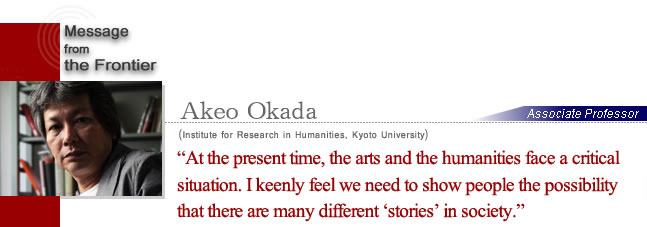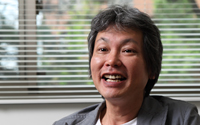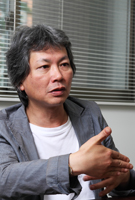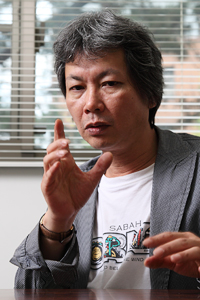
Associate Professor Okada teaches the history of modern Western music. From this specialized field, you might expect that he fills your head with technical information about the history of music from the Baroque to Romantic eras. On the contrary, Associate Professor Okada not only explains history, but also shows us diverse ways to understand and enjoy music more deeply. In time, we come to notice that those ways not only concern music, but also enrich our views of life and society. We interviewed Associate Professor Okada, a highly recognized scholar who currently is playing key roles in various fields, about his passion for research in music and the humanities.
"'Listening' to music should become a more profound pleasure by 'talking.'"

In his book, The History of Western Music, Dr. Okada calls Western music centered around classical music "the most powerful ethnic music in the world." Out of his aspiration to describe as vividly as possible what kind of people listened to the music, with what feelings, in what places and in what ways, the book focuses on the cultural-historical background of music. Moreover, in the modern age of music distribution through CDs and the Internet, which seems to have enabled people in all parts of the world to listen to the same pieces of music, he goes on to question such widely accepted phrases as "music transcends national borders" and "music is something to be felt because it transcends language." His book about the history of music, at the same time, suggests a totally new dimension of joy in listening to music.
To further develop this idea and show the underlying idea systematically, he published How to Listen to Music in 2009. In this book, Dr. Okada argues that the German Romantic poets initiated a revolutionary change in the value of music, elevating it from its old position as a second-class art form below poetry and painting and spreading the idea that music transcends language. The idea has influenced our attitudes toward music to this today, even inducing us to hesitate when talking in our own words about music.
Against such tendencies, Dr. Okada argues that music has its own grammar and idioms just like a language. In the same way we need to learn French to study French literature and understand it at a deep level, we should be able to listen to music with a deeper and greater pleasure by learning its "grammar" and "structure" and through "talking" about it. However, as we face music in new ways such as distribution through the Internet and mobile phone ringtones, thanks to the popularization of digital recording, he feels a sense of crisis that music may be losing its linguistic aspect and degrading into mere sounds. His insightful analysis and argument received high recognition, and his book was awarded the 19th Hidekazu Yoshida Prize in 2009.
"Researchers in the humanities, including music, must be ready to risk being labeled as rebels by society."

His keen analysis of music, as we have seen above, is made possible perhaps by his consistent position, which sees music as one of the disciplines belonging to the humanities. He goes on to say that researchers in the humanities need to have a sense of readiness. Hearing that he studies music, people often cast a doubtful eye as if to ask, "How can it have any meaning?" Since he is always made to feel guilty, he invariably arms himself with logic, arguing "The study of music is indeed meaningful." "My strong feeling is that the true meaning behind the humanities and social sciences including music lies not in blindly accepting society’s values and sending out messages to meet society's needs, but rather in figuring out what effective challenge they can present to the existing society. It rests, in my view, on the belief that, against conventional notions or patterns of society, one must continuously show a possible alternative from another dimension or suggest a new perspective on society or life that enables us to see social trends from a certain distance," says Dr. Okada fervently. In recent years, he has gained a keen sense of crisis from the fact that people tend more and more to drift in a single direction and eliminate those who deviate from that direction.
Such an approach to music on his part has led him to a research collaboration project at his institute with scholars from other disciplines, such as history and political science. Titled "The First World War: A Trans-disciplinary Study," the project has shed light on the role that Beethoven and Mahler's music played in 19th century society as a "system for moving the public’s emotions." Together with religion, their music functioned as a propaganda tool for colonial rule by the great imperialist powers in the West and most likely later influenced the methodologies used today to move audiences at large-scale concerts. "I deeply love classical music, but in fact imperialism spread it around the world as a tool of colonial rule. This ambivalence has been the big focus of my interest for the past several years. Now it’s time for us to overcome it." So how can we overcome it? To the interviewer’s question, he answered "Just don't listen to too much of Beethoven or Michael Jackson, performed by a large number of people, in which moments of ascendant feelings are created that imprint themselves onto our subconsciousness."
"In the wake of the earthquake disaster, I think the challenge for me as a researcher within the fields of music and the humanities is to continue presenting possibilities for different 'stories' to people."

After the Great East Japan Earthquake on March 11, Dr. Okada released the following statement on the Web.
"Not one of us can live without a 'story' to connect our past, present and future. We want to position ourselves in that big story. But what happened in the Great East Japan Earthquake is far beyond any explanation offered by familiar stories. We can endure most events if we are simply convinced of their 'meaning.' But we are now in such a gloomy mood because nobody can tell us a story that can give proper meaning to what is currently taking place. It is in this sort of situation that history, literature and art can play their roles. History is a story and, needless to say, so is literature. Music is also a story. To know history, literature and art can be nothing more than asking wisdom from the past, 'How should I live now?'"
To present diverse possibilities to people so they can listen to what music tells them, understand various stories presented within music, and tell their own stories through music is what Dr. Okada thinks is required of himself as a researcher in the field of music.
Episode
It was an encounter which changed his life, says Dr. Okada on meeting Masao Maruyama, a political scientist and philosopher. "Human scientists can enjoy books on Kantian philosophy just as casually as reading a weekly magazine. And when reading a weekly magazine, they read it just as seriously as when reading Kant. Whether it’s scholastic research, hobbies or stories in a weekly magazine, they talk with equal passion and seriousness without having any difference in attitude. In short, anything done by humans is a source of interest for them. Mr. Hidekazu Yoshida also possesses a similar trait." And so does Dr. Okada, who exhibits an equal passion in talking about music or his favorite actress. "In this respect, lately students seem to have a narrower scope of interest and tend to be conformists compared to the past," he said, apparently with a little frustration.
On the other hand, he tries not to bore students in class, bringing out various topics from his “stock box” which contains a wide variety of fields. "This is what I learned as a part-time English teacher at a preparatory school during my graduate school years: teachers and musicians, first of all, must be entertainers. The essence of an entertaining spirit is the awareness that what is essential is how well you have satisfied the audience without making them bored. You shouldn't flatter them, though," he says. By now, you may be feeling eager to attend his lecture (or performance).
Reported on June 21, 2011
Profile
Associate Professor Akeo Okada was born in Kyoto in 1960. His grandfather was a famous scholar of Japanese literature and his father a biologist. Because his father loved music so much, he was forced to take piano lessons even before the age of three. The excessively Spartan method drove him away from the piano, leading him to spend his elementary school days hunting insects. However, he still continued listening to music as the family had an enormous collection of music records and books. Around the age of ten, he was so precocious that he learned by heart the German libretto of Die Fledermaus, a famous operetta composed by Johann Strauss II. Later, as a junior high school student, he rediscovered his passion for musical performance, and played the clarinet in the school orchestra for six years until he graduated from high school.
In those years, fascinated by the music critic Hidekazu Yoshida, he held the belief that "music is a discipline within the humanities" and aspired to study music at a university rather than a music or art college. As a result, he enrolled in Osaka University, which had just founded a new musicology program (Kyoto University had no musicology program at the time). But the university offered no course in music theory. So he had private lessons with a composer and studied with a schoolmate from Kyoto (now Professor Nobuhiro Ito of Osaka University) at a café, translating papers and having discussions. It turned out to be a valuable experience, says Dr. Okada.
In 1988, he completed his doctoral program at the university and went to Germany to study operas at the world’s center of music studies. After studying in the doctoral program at the University of Freiburg, he returned to Japan in 1992 and was appointed assistant professor at Osaka University. In 1994, he was appointed associate professor at Kobe University’s Faculty of Human Development. In 1996, he earned his Ph.D. in literature from Osaka University with "A Study of Der Rosenkavalier by Richard Strauss." Since 2003, he has held his current position at Kyoto University’s Institute for Research in Humanities. He has been active ever since not only in research and authoring activities, but also as a lecturer and panelist at concerts and symposia, while also recently appearing on TV programs.
Awards
2001 Suntory Prize for the Social Sciences and Humanities ("The Fate of Operas" [Chuko Shinsho]; Chuokoron-Shinsha, Inc.)
2009 Minister of Education Young Researcher Award for Fine Arts ("I Want to Be a Pianist!"; Shunjusha Publishing Company)
2009 Hidekazu Yoshida Prize ("How to Listen to Music" [Chuko Shinsho]; Chuokoron-Shinsha, Inc.)

